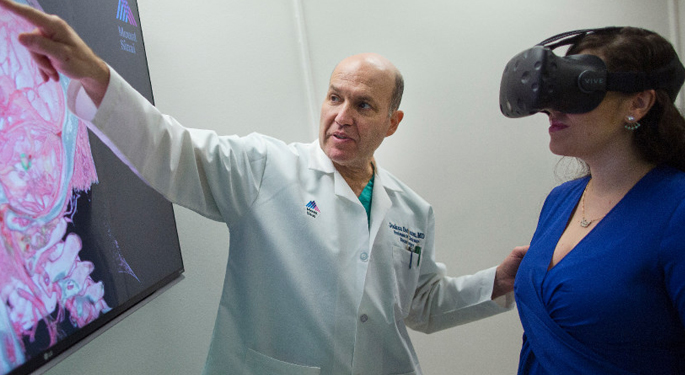Pituitary Disorders


At Mount Sinai, we diagnose and treat patients with a variety of pituitary disorders caused by tumors, including:
- Acromegaly
- Craniopharyngioma
- Cushing’s disease
- Hyperprolactinemia
- Hypopituitarism
- Inflammatory and autoimmune processes in the pituitary
- Rathke’s cleft cyst
We treat pituitary disorders in several ways, including medical therapy, minimally invasive surgery, and advanced stereotactic radiosurgery. Our multidisciplinary team includes experts in neurosurgery, endocrinology, neuroradiology, neuro-ophthalmology, and otolaryngology (ear, nose, and throat specialists) and head/neck surgeons.
Diagnosis
When you come to Mount Sinai, we start by taking a comprehensive medical history and conducting blood and urine tests and imaging tests. We use advanced neuroendocrine stimulation and suppression testing (including by magnetic resonance imaging and petrosal sinus sampling) to help diagnose and pinpoint the precise location of complex pituitary disorders.
Treatment
To treat pituitary disorders, we use a combination of medicine, pituitary surgery, and radiation therapy.
We perform transsphenoidal surgery, a minimally invasive procedure that removes the pituitary tumor through your nose. We follow you closely after treatment to make sure your hormone levels return to normal.
As a patient at Mount Sinai, you also benefit from our heavy involvement with research. You can participate in new therapies through ongoing pituitary clinical trials.
The Pituitary Gland
The pituitary is located deep in the center of the skull, under the brain, just behind the nose, where it hangs from the hypothalamus by a thread-like stalk. The gland uses this stalk to communicate with the hypothalamus, which controls the nervous system. Together, these organs make sure that the body is producing as much hormone as the body needs. This pea-sized organ has two lobes: the anterior lobe and the posterior lobe.
The larger anterior lobe produces these hormones:
- Adrenocorticotropic hormones control the adrenal glands, getting them to release cortisol, a stress hormone that is essential in the body's metabolism of fats, carbohydrates, and protein. The adrenals also regulate our blood pressure as well as the amount of sodium and potassium in the body.
- Growth hormones regulate several processesincluding growth and metabolism.
- Luteinizing hormone and follicle-stimulating hormone control the production of testosterone, estrogen, sperm, and egg maturation and release.
- Prolactin stimulates the production of breast milk.
- Thyroid stimulating hormones control functions such as metabolism, muscle control, brain development, and bone health.
The posterior lobe releases two hormones, oxytocin and anti-diuretic hormones, both produced in the hypothalamus. Oxytocin stimulates milk ejection during breast feeding and uterine smooth muscle contractions at birth. ADH controls body water stores by signaling the kidneys to retain water in the body rather than getting rid of it through urine.
Referrals
If you are concerned you have a pituitary disorder and would like a second opinion from one of our expert physicians, please call our office at 212-241-3422 to arrange an appointment with our care team.
Prior to your appointment, send us a copy of any imaging tests and reports and a copy of your labs. You can fax this information to 212-423-0508.
Information for Physicians
Physicians who would like to refer a patient to the Pituitary Care and Research Center can call the office at 212-241-3422. Our physicians are committed to fitting in new patients with two weeks.
Please provide your office information and additional contact information, so that we can ensure excellent communication and include you on all correspondence. Please fax records to us 212-423-0508 and include:
- Lab results (including prior endocrine testing)
- Compact disc of relevant imaging (such as computerized tomography, magnetic resonance imaging, and X-rays)
- Pathology reports